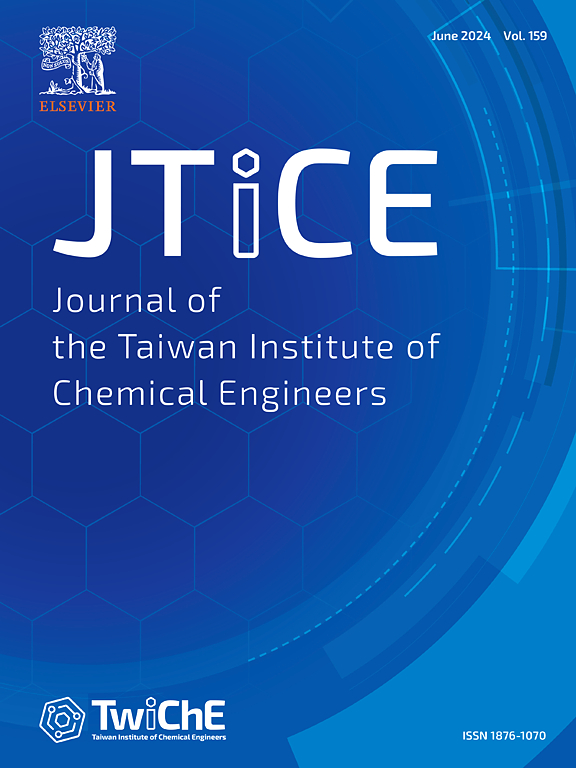High-performance biochar derived from the leaves of Quercus dentata thunb for triclosan removal
IF 5.5
3区 工程技术
Q1 ENGINEERING, CHEMICAL
Journal of the Taiwan Institute of Chemical Engineers
Pub Date : 2024-11-01
DOI:10.1016/j.jtice.2024.105812
引用次数: 0
Abstract
Background
Triclosan (TCS) is a common antimicrobial additive. Despite its low concentration, its frequent use and widespread application result in significant amounts of TCS entering the environment. In the environment, TCS undergoes photodegradation, producing harmful byproducts such as dioxin-like substances and chloroform, which are highly toxic. Due to TCS's lipophilic nature, it easily accumulates in animal tissues, ultimately posing a threat to human health. Therefore, there is an urgent need for a powerful and efficient method to remove TCS from water bodies.
Methods
Using discarded traditional Chinese medicine as raw material and KOH as an activator, biochar was prepared. The material was characterized, and its adsorption capacity for TCS under various conditions was evaluated.
Significant Findings
Compared to the existing biochar materials' TCS adsorption capacity (13.9 mg/g-395.2 mg g-1), the KOH-modified biochar (KMBC) in this study demonstrated an exceptional adsorption capacity of 639.13 mg g-1 for TCS. KMBC can swiftly remove 98 % of TCS from water within 30 min, even with a minimal biochar concentration of 0.225 g/L, and it exhibits strong anti-interference capabilities. Most importantly, water treated with KMBC is virtually free of TCS, effectively mitigating its impact on environmental organisms.

从柞树叶中提取的高性能生物炭用于去除三氯生
背景三氯生(TCS)是一种常见的抗菌添加剂。尽管三氯生的浓度很低,但其频繁使用和广泛应用导致大量三氯生进入环境。在环境中,三氯生会发生光降解,产生有害的副产品,如二恶英类物质和氯仿,具有剧毒。由于 TCS 具有亲脂性,很容易在动物组织中积累,最终对人类健康造成威胁。方法以废弃中药为原料,以 KOH 为活化剂,制备生物炭。重要发现与现有生物炭材料对三氯氢硅的吸附能力(13.9 mg/g-395.2 mg g-1)相比,本研究中的 KOH 改性生物炭(KMBC)对三氯氢硅的吸附能力高达 639.13 mg g-1。即使生物炭的最小浓度为 0.225 g/L,KMBC 也能在 30 分钟内迅速去除水中 98% 的三氯氢硅,而且具有很强的抗干扰能力。最重要的是,经 KMBC 处理过的水几乎不含 TCS,从而有效减轻了 TCS 对环境生物的影响。
本文章由计算机程序翻译,如有差异,请以英文原文为准。
求助全文
约1分钟内获得全文
求助全文
来源期刊
CiteScore
9.10
自引率
14.00%
发文量
362
审稿时长
35 days
期刊介绍:
Journal of the Taiwan Institute of Chemical Engineers (formerly known as Journal of the Chinese Institute of Chemical Engineers) publishes original works, from fundamental principles to practical applications, in the broad field of chemical engineering with special focus on three aspects: Chemical and Biomolecular Science and Technology, Energy and Environmental Science and Technology, and Materials Science and Technology. Authors should choose for their manuscript an appropriate aspect section and a few related classifications when submitting to the journal online.

 求助内容:
求助内容: 应助结果提醒方式:
应助结果提醒方式:


